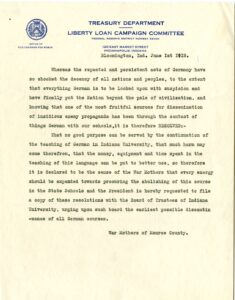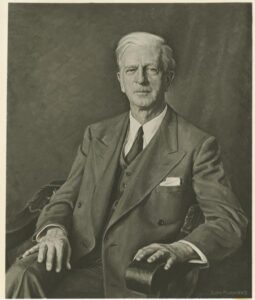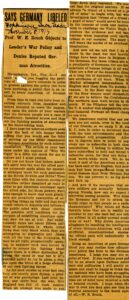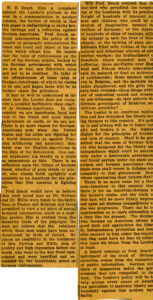“President Bryan made a statement to the Board concerning the German situation at the university”—Board of Trustee Minutes, April 17, 1918.
For the past several months, I’ve been working to slowly transcribe the WWI-era hand-written minutes of the Board of Trustees for inclusion in this searchable online portal and one question has continued to weigh on me. What exactly was “the German situation”?
While the Great War raged in Europe, anti-German feelings ran high state-side and Indiana University was not exempt from coming under fire for associations with the enemy. After some investigation, the exact “German situation” is still a little vague; however, there are still some fascinating stories from the era.

One of these controversies involved the teaching of the German language. By mid-1918 enrollment in German language courses at Indiana University had declined and only two professors, Bert J. Vos and Carl Osthaus, remained on the faculty. Across the country, teaching German in the schools (including universities) became a contentious issue. In June 1918, IU President William Lowe Bryan received a letter from the War Mothers of Monroe County which argued that “one of the most fruitful sources for dissemination of insidious enemy propaganda has been through the contact of things German with our schools.” They further stated that “it is therefore RESOLVED: — That no good purpose can be served by the continuation of the teaching of German in Indiana University, that much harm may come therefrom.” President Bryan coolly responded that the teaching of German would remain “as a means of fighting Germany.” When further questions poured in from individuals such as Dr. Perry Dickie of the American Defense Society, President Bryan responded that “German is not required for entrance” but that “we provide a few classes in German for students who desire it.” Additionally, by the fall of 1918 students enlisted in the Student Army Training Corps were learning German for military purposes.

While controversy surrounded the teaching of German, two professors also found themselves at the center of the debate. History professor James McDonald found himself the subject of a Senate investigation when a German by the name of Dr. Karl A. Fuehr included him in his “important list of names” which the the Department of Justice stated were all pro-Germans. McDonald, however, demonstrated to the Senate Investigation Committee that the accusation was erroneous and that he was a loyal American citizen, stating that “Ever since the sinking of the Lusitania I have not merely privately but also publicly both in class and in the press strongly advocated the entrance of the United States into the war against Germany, as my students and associates can readily testify” (from a letter to the Chairman of Senate Investigating Committee, December 11, 1918). McDonald would go on to work first for the League of Nations and then for President Roosevelt’s Advisory Committee on Political Refugees in Europe. He recognized early on the danger the Jewish people faced from Hitler. McDonald would also become the first US Ambassador to Israel.

The second and most controversial case was that of Professor William Zeuch. A young Iowan, Zeuch was hired in 1917 to teach economics at Indiana University. In November of 1917, Zeuch had replied to an Iowan newspaper’s anti-German statements, stating that the newspaper was printing propaganda and because the recent German atrocities were not unique to Germans as a race, the newspaper was thus offending German-Americans.

The newspaper replied by thoroughly denouncing Zeuch. News spread to Bloomington, where Zeuch found himself under investigation by the Monroe County Council of Defense and a committee of professors at the University. The Bloomington Indiana Daily Student on November 14 reported: “Mr. Zeuch affirms that he had no intention of being disloyal or unpatriotic when he wrote the letter to the Hopkinson Leader. He said to a representative of The Student that he had been incensed at the attempts which have been made to arouse hatred against the German race, but that he wished to condemn its autocracy.” Newspapers across the state reported on the scandal and Zeuch was asked to resign from his position. He did and joined the Army, from which he was honorably discharged in 1918. After the war, Zeuch co-founded a short-lived college in Arkansas, Commonwealth College, with a program that reflected his sentiments for socio-economic reform. He was also a Guggenheim fellow in the 1930s and worked for the Department of the Interior.
Zeuch co-founded a short-lived college in Arkansas, the Commonwealth College, with a program that reflected his sentiments for socio-economic reform.
To learn more about either of these incidents or more about Indiana University during WWI, contact the IU Archives.
Leave a Reply